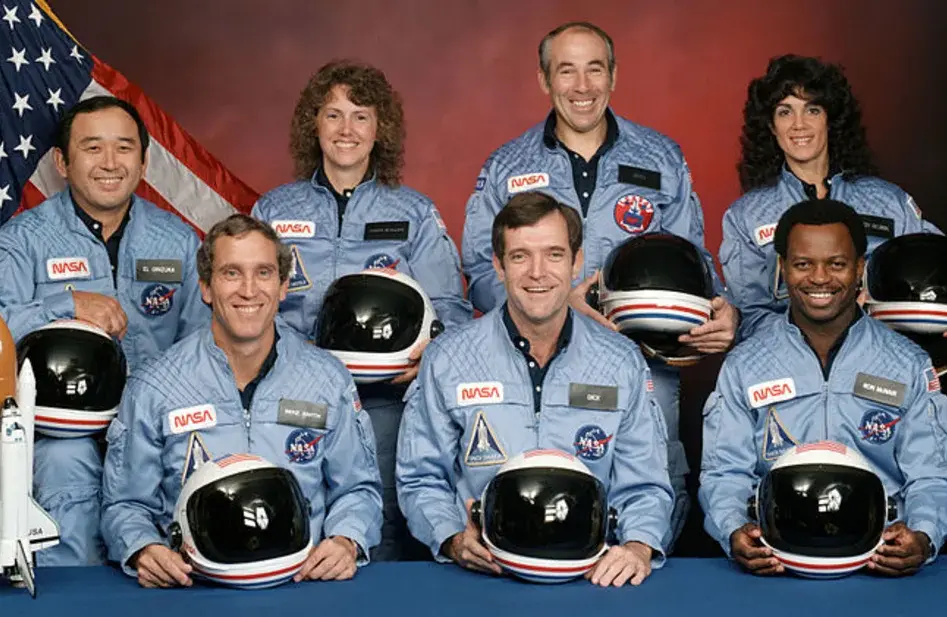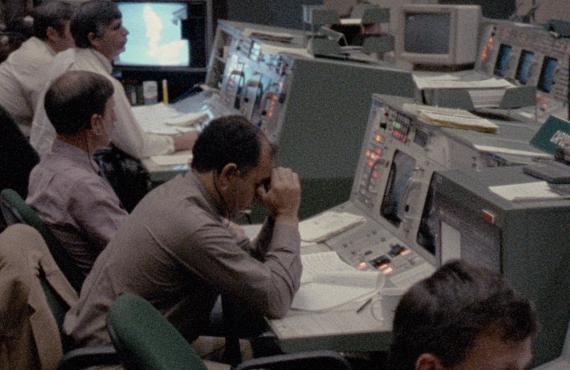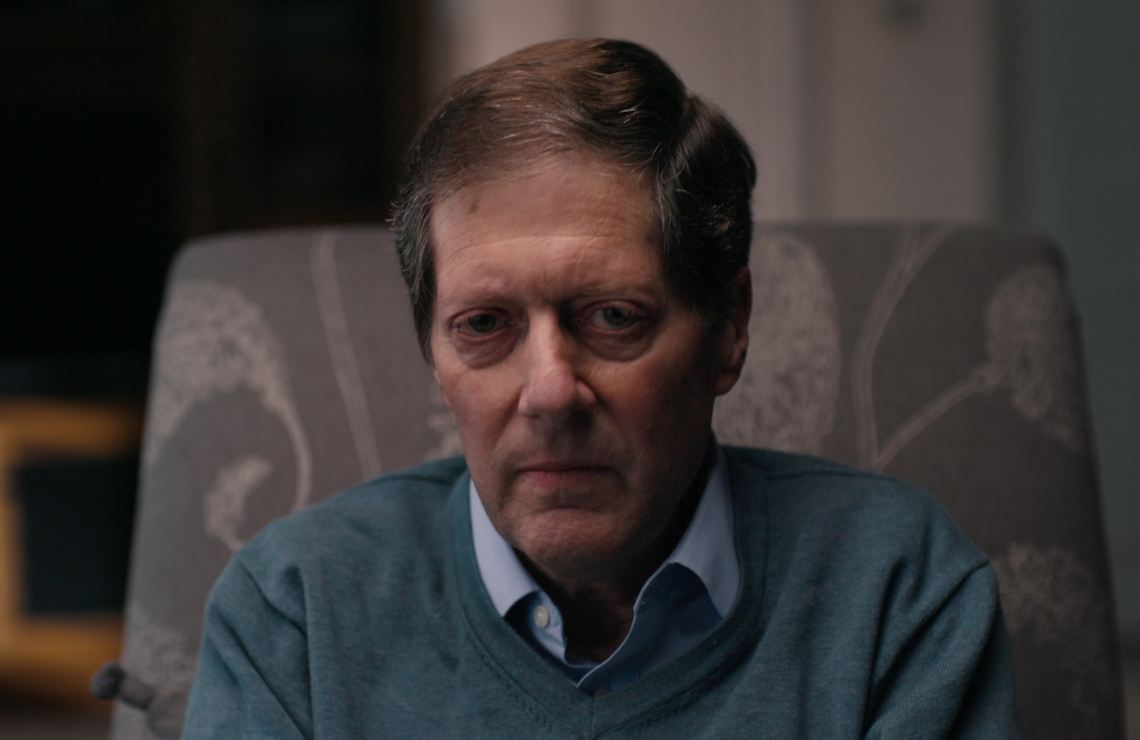Netflix's Challenger: The Final Flight Tells an Unforgettable Story That America Somehow Forgot
-
 Ellison S. Onizuka, Mike Smith, Christa McAuliffe, Dick Scobee, Gregory Jarvis, Judith Resnik, and Ronald McNair. (NASA)
Ellison S. Onizuka, Mike Smith, Christa McAuliffe, Dick Scobee, Gregory Jarvis, Judith Resnik, and Ronald McNair. (NASA)Challenger: The Final Flight is an immersive and nearly flawless four-part docuseries that had me hooked from the get-go. And here’s the amazing part — there’s almost no mystery to it. From its ill-fated liftoff on January 28, 1986, the Challenger was the top news story for more than a month, with every twist and turn in the dramatic investigation playing out on the nightly news.
Yet here we are, learning about it all over again, in this three-hour production led by directors Steven Leckart and Daniel Junge and producer J.J. Abrams. It takes nothing away from this expertly-made, fast-paced film to point out that the American people got a full accounting of what happened then, and that Errol Morris’ gumshoe services were not needed here. The secrets and lies, the cover-ups and tragic bungles — some of which will leave you slack-jawed — have been a matter of public record for more than 30 years. That all of those details have long since slipped into the collective memory hole gives this film surprising emotional rawness.

If you’re of a certain age you remember where you were that day in January when, barely a minute after liftoff from Cape Canaveral, the Challenger disappeared in several plumes of smoke. On the ground the immediate response was confusion. What just happened? The families and other spectators on the ground didn’t know. The media didn’t know. Even NASA didn’t know. Mission Control in Houston locked down for several hours, as a nation stood dumbstruck and grieving before their TV sets. More than one person here is heard to compare that day to November 22, 1963, and not without reason.
As we soon learn, the Challenger tragedy was no accident but rather a highly preventable disaster that had been allowed to happen through bureaucratic imperatives that overrode science and common sense. Aided by wonderful behind-the-scenes footage, home movies, and interviews with key players, that story unfolds here in a docuseries that (for once) is just the right length for the story it’s telling.
By 1986 the space shuttle program was old news. The reusable Challenger and its sister shuttles had collectively flown dozens of missions; NASA had 16 more planned for that year. So there was pressure to keep the line moving — but also, it turns out, pressure to bring a little sexy back to the space program. One of the many nice touches of nostalgia here is when a NASA insider talks about the latest launch being “buried on page 3.” Soon only old coots like me are going to remember what a humiliation that was.
There was a competition to put a teacher on board the shuttle, and that put NASA back on page one. Christa McAuliffe, a dynamic social studies teacher from Concord, New Hampshire, was selected from a nationwide competition. Among the things I learned from watching Challenger: The Final Flight is that liftoff was originally scheduled to happen on Sunday the 26th. Had it happened then, America’s schoolchildren may or may not have been watching from home. But the launch was delayed until Tuesday. That gave teachers time to commandeer their school’s rolling TV carts and round up the kiddos to watch and experience the launch of the first teacher into space together, thus magnifying the horror of what happened next.
As the film’s well-paced but gut-wrenching narrative explains, those intervening 48 hours saw many red flags ignored — problems with the new launch date, opportunities for people to speak up and be heard. And yet no one seemed able to stop the shuttle from launching. Nobody inside NASA, or the contractor in Utah that made the faulty booster rocket, wanted to take the heat for stopping the line.

Challenger is unusual in that many principal players involved are still alive and were willing to speak candidly about their role in the disaster. The head of mission control. NASA engineers. Key members of the contractor team. And yet the voices you can’t forget are those of the spouses, the children, and the friends for whom the details of that tragedy still have the power to overwhelm. A surprisingly strong voice comes from Barbara Morgan, who was McAuliffe’s alternate for the teacher-in-space program and was a full participant in all the pre-launch activities.
I never thought I would say this about the Eighties, but America sure seemed simple and innocent back then. The president was Ronald Reagan, who was certainly divisive in his own way. But the Gipper also had a way of bringing people together with his soothing, uplifting televised messages, and on the day the shuttle exploded he was at his best. Looking pained and shaken, Reagan promised a full investigation into the disaster. He evoked the image of the seven crew members, in their sky blue NASA jumpsuits, walking to the shuttle for the last time. And then he ended by quoting from “High Flight,” a World War II-era poem that is a favorite among aviators. The Challenger crew, Reagan said, had “slipped the surly bonds of Earth … and touched the face of God.”
January 28, 1986, was the day the space program lost its innocence. NASA had always warned Americans of the dangers of space flight. But it had never warned about agency incompetence or bureaucratic timidity — the two things that ultimately brought down this ship, and almost brought down NASA. (Arguably, the second shuttle disaster, involving Columbia in 2003, did bring an end to the public-sector era of space travel.)
Challenger: The Final Flight debuts on Netflix on September 16th.
Aaron Barnhart has written about television since 1994, including 15 years as TV critic for the Kansas City Star.
TOPICS: Challenger: The Final Flight, Netflix, J.J. Abrams, Ronald Reagan
- Away has been a parade of consequence-free blandness, but one episode feels relevant to the coronavirus era
- Netflix's Challenger: The Final Flight feels especially relevant amid the coronavirus pandemic
- Watch the trailer for Netflix docuseries Challenger: The Final Flight
- Ten New and Returning Shows to Watch on Netflix in September 2020